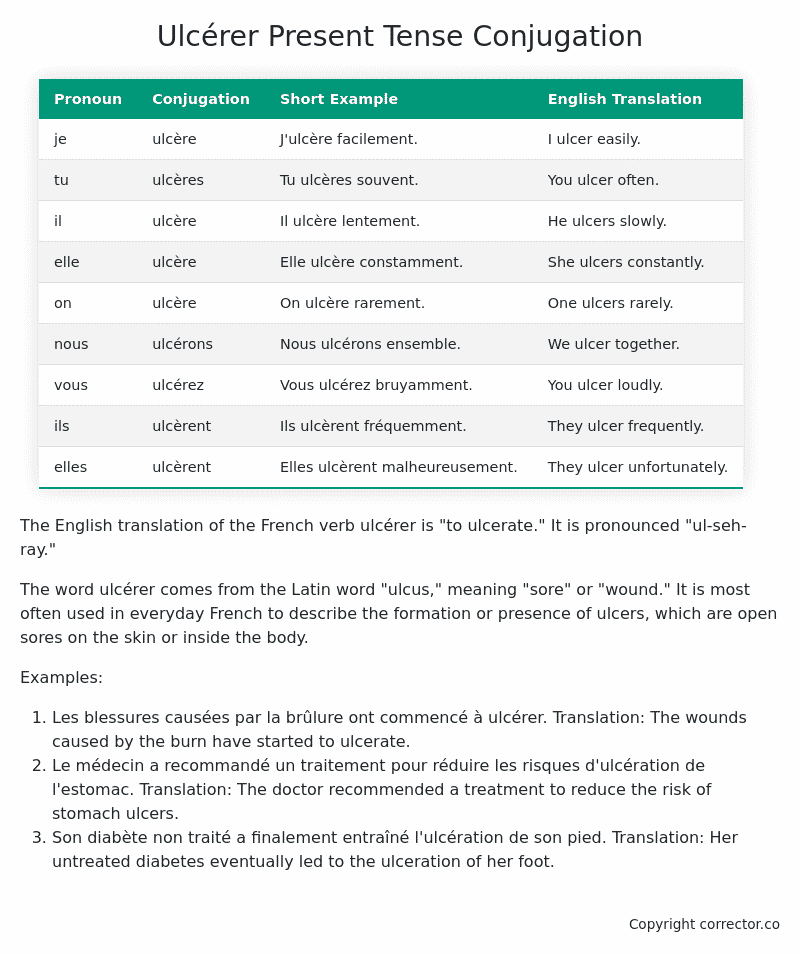Le Present (Present Tense) Conjugation of the French Verb ulcérer
Introduction to the verb ulcérer
The English translation of the French verb ulcérer is “to ulcerate.” It is pronounced “ul-seh-ray.”
The word ulcérer comes from the Latin word “ulcus,” meaning “sore” or “wound.” It is most often used in everyday French to describe the formation or presence of ulcers, which are open sores on the skin or inside the body.
Examples:
- Les blessures causées par la brûlure ont commencé à ulcérer. Translation: The wounds caused by the burn have started to ulcerate.
- Le médecin a recommandé un traitement pour réduire les risques d’ulcération de l’estomac. Translation: The doctor recommended a treatment to reduce the risk of stomach ulcers.
- Son diabète non traité a finalement entraîné l’ulcération de son pied. Translation: Her untreated diabetes eventually led to the ulceration of her foot.
Ulcérer – About the French Present Tense
To take a deep dive into all the French tenses then see our article on Mastering French Tense Conjugation.
Common Everyday Usage Patterns For Le Present
Interactions with Other Tenses
Table of the Present Tense Conjugation of ulcérer
| Pronoun | Conjugation | Short Example | English Translation |
|---|---|---|---|
| je | ulcère | J’ulcère facilement. | I ulcer easily. |
| tu | ulcères | Tu ulcères souvent. | You ulcer often. |
| il | ulcère | Il ulcère lentement. | He ulcers slowly. |
| elle | ulcère | Elle ulcère constamment. | She ulcers constantly. |
| on | ulcère | On ulcère rarement. | One ulcers rarely. |
| nous | ulcérons | Nous ulcérons ensemble. | We ulcer together. |
| vous | ulcérez | Vous ulcérez bruyamment. | You ulcer loudly. |
| ils | ulcèrent | Ils ulcèrent fréquemment. | They ulcer frequently. |
| elles | ulcèrent | Elles ulcèrent malheureusement. | They ulcer unfortunately. |
Other Conjugations for Ulcérer.
Le Present (Present Tense) Conjugation of the French Verb ulcérer (this article)
Imparfait (Imperfect) Tense Conjugation of the French Verb ulcérer
Passé Simple (Simple Past) Tense Conjugation of the French Verb ulcérer
Passé Composé (Present Perfect) Tense Conjugation of the French Verb ulcérer
Futur Simple (Simple Future) Tense Conjugation of the French Verb ulcérer
Futur Proche (Near Future) Tense Conjugation of the French Verb ulcérer
Plus-que-parfait (Pluperfect) Tense Conjugation of the French Verb ulcérer
Passé Antérieur (Past Anterior) Tense Conjugation of the French Verb ulcérer
Futur Antérieur (Future Anterior) Tense Conjugation of the French Verb ulcérer
Subjonctif Présent (Subjunctive Present) Tense Conjugation of the French Verb ulcérer
Subjonctif Passé (Subjunctive Past) Tense Conjugation of the French Verb ulcérer
Subjonctif Imparfait (Subjunctive Imperfect) Tense Conjugation of the French Verb ulcérer
Subjonctif Plus-que-parfait (Subjunctive Pluperfect) Tense Conjugation of the French Verb ulcérer
Conditionnel Présent (Conditional Present) Tense Conjugation of the French Verb ulcérer
Conditionnel Passé (Conditional Past) Tense Conjugation of the French Verb ulcérer
L’impératif Présent (Imperative Present) Tense Conjugation of the French Verb ulcérer
L’infinitif Présent (Infinitive Present) Tense Conjugation of the French Verb ulcérer
Struggling with French verbs or the language in general? Why not use our free French Grammar Checker – no registration required!
Get a FREE Download Study Sheet of this Conjugation 🔥
Simply right click the image below, click “save image” and get your free reference for the ulcérer Present Tense tense conjugation!

I hope you enjoyed this article on the verb ulcérer. Still in a learning mood? Check out another TOTALLY random French verb present conjugation!


